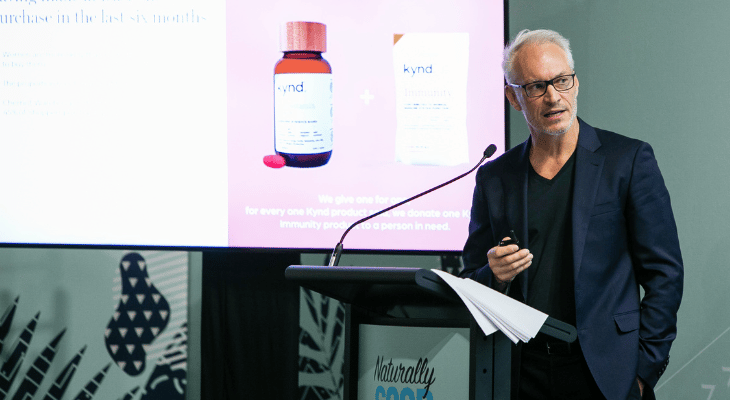Speaker Series Spotlight: The Future of Healthy Foods
Australia’s market for healthy food and drink is growing and evolving fast.
The interest in healthier food coincides with many factors in our society, from our desire to look and feel good, nutritional needs, food intolerances, sustainability and, of course, the impact of COVID-19.
The big question is, how does this affect the attitudes, behaviours, consumption and buying habits of Australian consumers? The pandemic has given people time to consider their health and lifestyle choices. This reset has given rise to permanent changes that represent a seismic shift in the healthy foods market.
Davidson Branding Founder Grant Davidson was one of more than 30 speakers who educated audiences this year at Naturally Good. Here he draws on nearly 150 global and local reports, case studies, and insights from experts, including Mintel, Roy Morgan and Future Foods to present key consumer drivers for now and beyond.
Here David highlights the six consumer drivers for 2022 and beyond from his presentation The Future of Healthy Foods.
1. I think nature knows best and you don’t mess with a good thing
Customers are moving more and more towards buying organic produce as a lifestyle choice. The organic market is estimated to be growing at 20 per cent per annum and domestic consumption is expected to reach 2.3billion by 2030. The perception of food being natural is the single most potent ingredient claim.
In fact:
- 59% of consumers are believing that natural products are better at meeting their nutritional needs.
- 51%of Australian consumers are willing to pay more for products containing more natural ingredients.
- 45% of Australian consumers are dissatisfied with the range of natural food and beverage options available at supermarkets. The position that a product is natural can be enhanced using a range of explicit and implicit cues.
2. I use food as a medicine by eating good things and not eating bad ones
Some 44% of consumers already using superfoods to address their medical condition. Superfoods play a particular role with one in three believing they offer not just physical by emotional and mental benefits. Most superfoods carry with them a backstory which carry with them a story which provides an emotional connection to a simpler lifestyle.
Australian brands are also seeking to leverage Australian superfoods. For example, Koko Black has launched and Australian native collection featuring lemon myrtle and Davidson plum.
Many Australians are also attempting to restrict their intake of other components for a range of health concerns. Some 46 per cent try to avoid food additives whilst only 6 per cent of adults have an actual food allergy.
3. I’ll have it in a pill, so I don’t have to think about it
In 2019 the comp medicine sector was valued at $5.6 billion. Thanks to the pandemic, there has been an increased demand for supplements and vitamins, particularly those supporting immune support, Vitamin C and antioxidants, Vitamin D and probiotics. It’s worth noting that the target in this market also tends to follow alternate dietary lifestyles.

4. I’ll have it in a box and leave it at the door thanks
Online delivery meal services are now an accepted part of Australian life. Some 19 per cent of Aussies have used a service in the last three months. In this rapidly growing meal category health also plays a vital role. Half of all meal service users saying they prefer healthy meal options.
Coles recently responded to this by releasing 100 ready to eat meals with a three- or four-star health rating.
5. I’m very flexible because my life isn’t straightforward
Whilst 12.1% of consumers claim to have a wholly vegetarian diet, out of other plant lovers 39% still eat meat. With plant protein growing at an average rate of 48%+ per annum, Australia is the world’s third-fastest growing plant-based food market. The growth rate has been quite phenomenal with Woolworths seeing a 32% year on year increase in demand for plant-based alternatives.
Importantly, there is one person deciding to eat less meat or going meat free every five minutes. The pandemic has accelerated the trend to eat less meat and pro-social factors are a driving force for many.
6. I’m eating for tomorrow because it does make a difference
A huge number of Australians – 86% – say a company’s social and environmental efforts are moderate to extremely important in deciding what to purchase. In 2017 Fenn Foods introduced the world’s first carbon plant-based mince and plans to have the whole company and products carbon neutral by the end of 2022. Nestle has now launched a carbonated soft drink based on discarded coffee fruit – Cascara. And Coca Cola Amatil who recently committed to being carbon neutral by 2040, have a range of strategies in place including 100 per cent renewable energy.
The message for all food brands is clear – a multi-faceted approach to corporate and social responsibility is no longer simple ‘nice’ to have – it is a strategic neccesity.
-
Enquire!
- Book a stand
